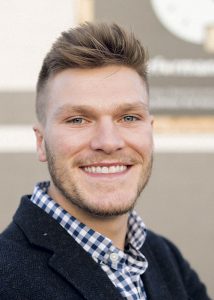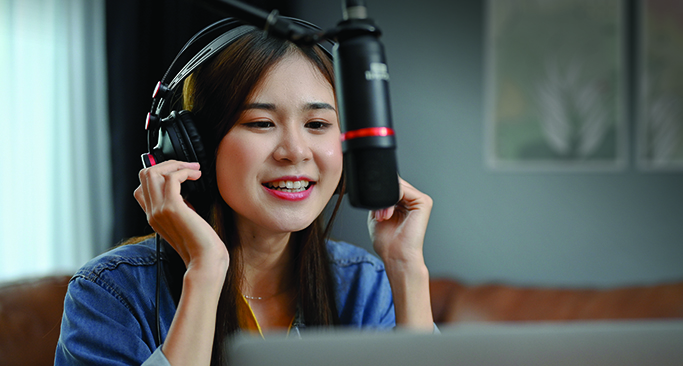DO YOU WANT TO START A PODCAST?
Best practices for beginning a program
Personally, I enjoy that my interactions with others,
and not just producers, allows me to add to my insurance acumen.
By Christopher W. Cook
How many of you read the title of this article to the rhythm of “Do You Want to Build a Snowman?” from Disney’s Frozen? Who’s doing it now? You’re welcome.
Last year, I began writing a Professional Development series on insurance podcasts. While the series wrapped earlier this year, I thought we’d revisit the topic once more because maybe some of our readers might be considering starting one of their own. After all, the hosts talked about having fun while engaging in discussions with industry leaders. Who wouldn’t want that?
So, you’ve decided to start your own podcast. But where do you begin? Members of the Young Professional Insurance Agents (YPIA) of Indiana found themselves in a similar situation when they started their own show in October 2021, according to Mark Shoultz, an agent at Priority Risk Management in Fishers, Indiana, and the committee’s chair, who hosted a webinar titled “Becoming a Master of Your Craft Using a Microphone.”
Taking the helm of the conversation was avid podcast listener Sean Kirby, an insurance agent at Performance Group in Pendleton, Indiana, who shared his journey of starting his own show, The Performance Group Podcast.
“I’ve always been told in life that if you like something, try it,” Kirby said. “I like podcasts, so I originally started because I was a young agent who was trying to learn how to network with business owners. I saw podcasting as an opportunity to get our business-owner clients or prospects in the building and hopefully learn from them and about them.”

“Failure is not the opposite of success; it is part of success. You’re going to hit opposition all the way with every new episode you post. It’s not going to be perfect.”
—Sean Kirby
Agent
Performance Group
Kirby also mentioned that the show was beneficial for his personal brand recognition. “Being a young person trying to get your name out there in the community, what’s the best way to do that other than to make a show all about somebody else, so that they can share it on their platform to not only talk about themselves, but also promote you and your brand?” he said.
As seen in my earlier podcast series, there’s a plethora of insurance podcast shows out there. So how can you make yours stand out in the crowd?
“Do something that nobody else is doing and run away from what every-body else is already doing,” Kirby said.
For example, numerous young agents reach out and immediately talk about providing a quote. Kirby uses his show as a way to meet with clients and prospects to discuss how they impact the community and run their business and then share it with others.
Another possibility for your show’s direction is to target your podcast’s discussion on a niche product. For example, a show could be geared toward agriculture and farming. This can help build your authority in that niche, said Kirby.
Motivation
So far, all of this may sound right up your alley, but what might be holding you back?
“The number one thing that is a hindrance for all people is the fear of failure,” Kirby said. “I fear failure every single day. That’s why I wake up and try to work a little bit harder.
“The hardest part of starting is taking that first step forward, but I like to say if you shoot for the moon, you still land in the clouds,” he added. “At the end of day, we’re trying to fail upwards.”
Kirby has had numerous struggles getting his show up and running, but he continues to press forward. “The number of people who have told me ‘no ‘to an interview is much higher than the number of podcasts I’ve done or interviews I’ve scheduled. And some-times you’re scheduled and they don’t show up; life happens,” he said.
Kirby’s first episode was recorded in February 2019, but it wasn’t released until January 1, 2020.
“I thought about how much I hated that episode the entire time,” he said. “I didn’t like every ‘and,’ ‘but’ or ‘uh’ I said throughout the conversation; I wanted to go back through and edit it. At the end of the day, nothing’s ever going to be perfect in your eyes.
“Failure is not the opposite of success; it is part of success,” Kirby pointed out. “You’re going to hit opposition all the way, with every new episode you post. It’s not going to be perfect. Sometimes the audio is going to be choppy. There’s always going to be a reason not to post, but I’ve learned more in the last two years from the things I screwed up.”
While practice makes perfect, consistency is key. “Consistency needs to be your metric,” Kirby said. “It is very easy when we get through the hustle and bustle of the day that we do not make [the show] a priority, and I’ve done it. I’ve had one-month lapses, but I have found the biggest groove in not only my listenership but my communication with clients has been when I’m consistently doing a podcast every week.
“The proof is really in the follow-up,” he observed. “You can have somebody come in, you sit down with them for an hour, and you have an awesome conversation. Then you send them all the links, but they don’t post it; you don’t get the audience reach that you wanted. You have to follow up with that person because they’re busy, too.”
Kirby sends his guests a gift—a mug with a picture of the guest with Kirby in front of a mural at their office that’s taken as part of their experience with the show. “It’s brand recognition,” Kirby said. “It’s the same picture I use to pro-mote the podcast episode. I’m sure somebody is going to say something to them about [the mug], and your name is going to be brought back up. Just like anything else, stay top of mind and follow up.”
What you need to start
What is the bare minimum that you need to start your own podcast?
“Realistically, it takes you, a topic and a recording device, and that could be your iPhone,” Kirby said. “Or you can be like me, who has tried every different kind of recording software and new microphone under the sun.”
As for technology, the following will be helpful:
- Recording software and device. This can even be a PC with Zoom.
- This can include the one on your cell phone.
- Editing software. Not required, but can be used to add intros, outros, music and other special effects.
- Hosting site. This is the platform used to distribute your podcast (e.g., SoundCloud, Buzzsprout). Most charge a fee based on data.
- RSS feed. This is what takes your podcast from your hosting site to other distribution channels like Apple Podcasts or Spotify.
If you’re still not sure about the technology involved, “there’s tons and tons of YouTube videos. I’ve learned everything that I’ve done for my podcast by searching on YouTube ‘how do I do a podcast?’” Kirby said.
Guests and audience
When it comes to guests for your show, “it’s all about who you want to talk to and what interests you,” Kirby said.
The Performance Group Podcast began with hosting small-business owners and then branched out to community organizers, nonprofits, and local people sharing events in the community. “It’s nice to be a community connector, getting more people involved,” Kirby said.
Kirby advises that if you plan to do a niche-based show, use LinkedIn as a source to connect with potential hosts. “The conversion rate of those messages is very high, because people want an opportunity to tell their story or talk about a topic that interests them,” he said. “I’ve always had the most fun when I pick out people I want to talk to, not people I think I should talk to.”
As for your audience, “At the end of the day, you’re going to have listenership. That’s the idea behind it, but don’t focus on the numbers,” Kirby said. “My numbers, listens, or down-loads aren’t my motivation to why I do my podcast. To me it’s for the guests, the information, the education, and all the things that it can provide. If I focus too much on the numbers, then I go back to that fear of failure.
“I’m on episode 40 and my listener-ship is very close to where it was when I started, but as long as I’m having the conversations that matter to me and I’m having fun, that’s what it’s all about. If you focus on the guests and the message, your audience will find you.
“Podcasts are very word-of-mouth based,” Kirby continued. “You always have somebody sharing information with somebody else. You’ve got to be active with your social media and actively promoting [an episode], and you’ve got to have your guests promoting it. This may take months, it may take years, but if your content is not there for [listeners] to backlog, you’re going to have a tough time.”
And the best way to make sure that your content is available is to be consistent. “It’s all about consistency and doing it over and over again—building a library [of episodes],” Kirby said. “The most amazing thing is that when I release a new episode, it will have X-amount of listens, and then I can see that in the seven days [after it was released] people are listening to all these other different episodes. I put a lot of time and energy into it, so it means a lot that people are going back and listening to more episodes and finding more things out. Repetition and consistency are everything.”
To reach your client base, do an email blast of each podcast episode, and don’t forget to link the show to your firm’s website.
If starting a podcast is up your alley, proceed. “I know firsthand how daunting it may seem to record and share your first podcast,” Shoultz said at the webinar’s conclusion. “We hope that no matter who you are or how long you’ve been in the industry, you can use podcasting to help grow your business.”
For more information:
The Performance Group Podcast
www.performancegroupindiana.com/performance-group-podcast
Young Professional Insurance Agents of Indiana Podcast
www.piaindiana.com/ypia-podcast





